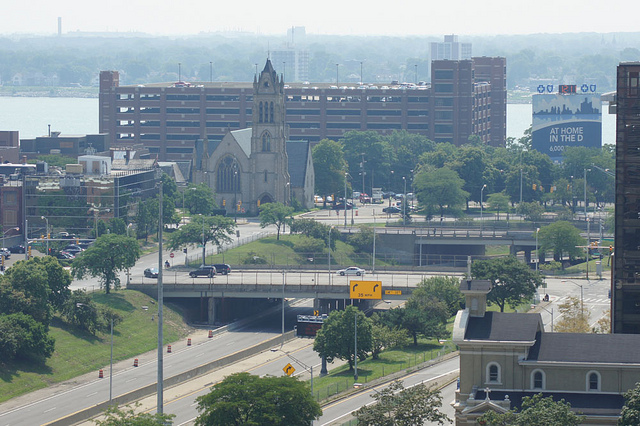When does freeway construction put us on a road to nowhere?

Charlie LeDuff, in his engaging “Detroit: An American Autopsy,” argues that Detroit’s plummet downward is best understood as a vanguard, that Detroit’s present and future is the future of every city in America. “Go ahead and laugh at Detroit,” he writes, “because you are laughing at yourself.”
Detroit’s fate resulted from complex factors. There is no single cause for its fall, but at the center of the nexus is the automobile. Like most American cities, Detroit built itself to accommodate the automobile. While this kind of development produced immediate economic gains, it extracted high financial and social costs. The result was repeated by local governments across the country: years of little growth coupled to second-generation maintenance costs related to auto-based development that generates no new cash flow.
Often when I talk to people about paying taxes, the first thing they’ll offer as justification is the nation’s road systems. Those systems, however, are emblematic of what is wrong with our political system, one very gifted at touting benefits while hiding costs.
The interstate highway system was created with complete disregard for the Constitution. When a bill for “internal improvements,” meaning the federal construction of roads and canals, appeared on his desk in 1817, James Madison who knew a thing or two about the Constitution, vetoed it. He acknowledged “the great importance of roads and canals” and that if Congress were going to pass such a law it would undoubtedly provide a “signal advantage to the general prosperity.” Yet that wasn’t sufficient for passage, for “such a power is not expressly given by the Constitution” whose “permanent success” depended on “a definite partition between the General and State Governments.”
Madison believed that justice required protecting the weak from the strong, and that investing power in the central government would naturally redound to the interests of the stronger. Consider the highway system in Detroit. It has been well documented how it carved up neighborhoods, displaced individuals, eviscerated communities, destroyed locally-owned businesses, and critically weakened the black middle class. Clearly some actors benefitted – the military and large-scale merchant enterprises primarily – while others were irreparably harmed. They’re the hidden price of progress.
Often these highways have destroyed the integrity, culture, and landscapes of once-thriving cities. Consider Detroit or Cincinnati or Louisville, where highway development has cut off citizens from their waterfronts and made their cities less walkable and less hospitable to local businesses. The Progressives believed that democracy is messy and inefficient and politics best left in the hands of experts, who could be counted on to get it right. Healthy cities are never about efficiency. Trial and error and failure are essential to growth, which is why it’s always best to keep things on as small a scale as possible, as we found out with our banking industry, unless failure becomes catastrophically large.
It is rarely the case that the strong oppress the weak out of malicious motives. Beware the tyranny of those who seek to do good on your behalf. Those who ripped Detroit apart with the interstate highway system were convinced their plan was enlightened. Ed Hustoles, part of the planning team, wistfully recalled “We thought we were doing good,” even while acknowledging his failure.
The Constitution is not designed to restrain only those who are maliciously motivated; it is primarily designed to restrain those who believe they are doing good, as Hamilton argued in Federalist #73, for the simple reason that human beings are fallible. “Do not give power to someone you agree with unless you’d be willing to give that same power to someone with whom you disagree” is not a bad maxim, and one that might have saved Detroit.
But “progress” can be reversed. Discussions are now taking place in Detroit about tearing up I-375, a first and necessary step in helping the city recover from its ill-fated experiment with automobile-based design. If Detroit, with its massive infrastructural and liability problems is the dark future of every American city, as I believe it is, then perhaps its effort to turn back the clock may offer hope.
See what new members are saying about why they donated to Bridge Michigan:
- “In order for this information to be accurate and unbiased it must be underwritten by its readers, not by special interests.” - Larry S.
- “Not many other media sources report on the topics Bridge does.” - Susan B.
- “Your journalism is outstanding and rare these days.” - Mark S.
If you want to ensure the future of nonpartisan, nonprofit Michigan journalism, please become a member today. You, too, will be asked why you donated and maybe we'll feature your quote next time!
 People used to live where cars roll by at freeway speeds today. It was called progress then, and maybe it was, but what was the cost? (Photo by gab482 via Flickr; used under Creative Commons license)
People used to live where cars roll by at freeway speeds today. It was called progress then, and maybe it was, but what was the cost? (Photo by gab482 via Flickr; used under Creative Commons license)